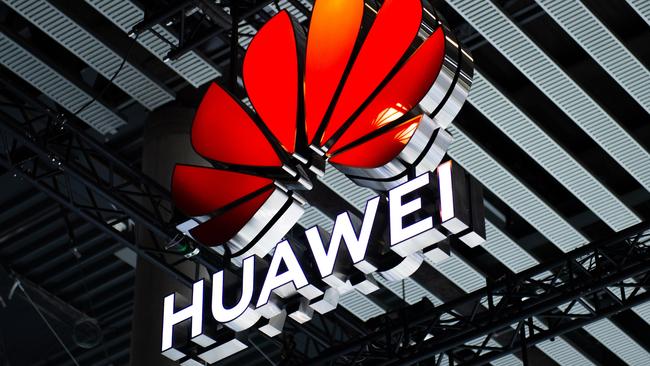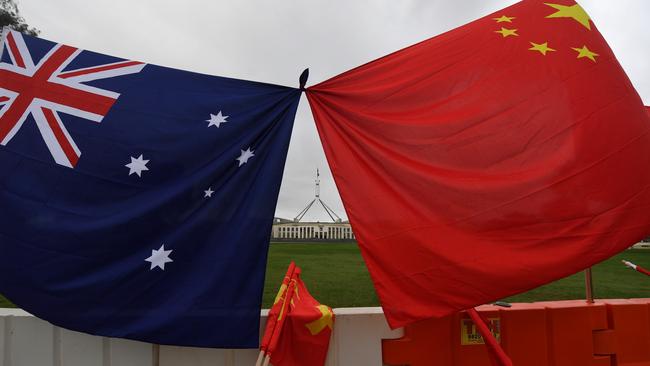China wants more investment access to Australia, its top diplomat tells a Sydney conference
China’s top diplomat, Liu Jianchao, wants greater investment certainty from Australia, saying his country has lost its appetite for striking new deals.

The Chinese Communist Party’s top diplomat, Liu Jianchao, has called on Prime Minister Anthony Albanese to provide greater certainty on government policies dictating Chinese investment in Australia, saying the Huawei and other bans had damaged appetite for striking fresh deals.
Answering a question from The Australian at his speech to the Australia China Relations Institute at Sydney’s UTS on Tuesday night, Mr Liu, who is head of the Communist Party’s International Department, said China hoped the improvement in political relations could result in a “rethink” in the attitude towards Chinese investment in Australia.
He said Chinese investors were wary of making proposals for investment in Australia in the wake of the move to ban Chinese telecommunications company Huawei from supplying equipment for the NBN and the 5G network in Australia, and other rejections of investment proposals by Chinese companies.
“Of course we would like to see more Chinese investment in Australia and we would like to see more Australian investment in China,” he said.
“It would be a mutually beneficial arrangement.”
He said he believed that the rejection of Huawei, and other investments from China on the grounds of “security factors” had been “overplayed” and had harmed the confidence of Chinese companies wanting to invest here.
The federal government in 2016 blocked a Chinese power company from buying a 50 per cent interest in NSW electricity company Ausgrid.
In August 2020, China Mengniu Dairy Co and Japan’s Kirin Holdings announced that they had given up on talks for the Chinese company to buy Kirin’s wholly owned Australian dairy firm, Lion-Dairy and Drinks Pty Ltd, because they did not expect to get the required approval from the Foreign Investment Review Board.
At the annual Australia China Business Council networking day in Canberra in 2022, former federal trade minister Andrew Robb said many Chinese companies wanting to invest in Australia were being discouraged by advisers from even submitting proposals to the FIRB, for fear of a public rejection.
Many potential Chinese investors in Australia were now taking their money elsewhere, such as to Africa and the Middle East.
Investors were also awaiting clarity on what the Albanese government’s policy might be on Chinese investment in the rare earths and critical minerals sector in Australia.
In February this year, federal Treasurer Jim Chalmers blocked the Chinese-owned, Singapore-registered Yuxiao Fund from increasing its stake in rare earths company Northern Minerals from 9.92 per cent to 19.9 per cent, citing national interest grounds.
Mr Liu told ACRI on Tuesday that he hoped that the improvement in the political relationship between the two countries could pave the way for more co-operation on business and investment.
“I do hope that, taking the opportunity of the improvement in the relationship, we should think twice about business co-operation policies and also opportunities between our two countries,” he said.
“When the relationship was sour, it could really harm people’s confidence and it could really lead to some kind of irrational policies (on investment).
“I hope that that could be reversed and that there will be some rethinking in this regard, so that the governments of the two countries can try their best to pave the way for normal and sustained co-operation in investment and trade.”

He said moves for more co-investment should be “done on the basis of market rules and also the WTO rules on the basis of the international global free and open trading system and business interactions between any economies”.
“The concern that we have is that Huawei has been rejected, and some other investments from China have been rejected,” Mr Liu said.
“The reason behind this is that the security factor has been overplayed.
“I don’t think that this is the right thing to do. It really harms the confidence of business people of both countries.”
He said Chinese investors at the moment were “not too sure what will happen when they are trying to invest, if they don’t see a clear future and if they don’t see any kind of certainty in the investment co-operation between the two countries.”
The remarks come as the annual review of Chinese investment into Australia by the University of Sydney and KPMG highlight the continued low levels of Chinese investment here in recent years.
The latest survey, released in April, shows that Chinese investment into Australia in 2022 was down to $US1.4 bn – only a fraction of the $US16.2bn in 2016.
While it was slightly higher than the $US585m in new investments in 2021, it was still lower than pre-Covid levels of $US6.2bn in 2018 and $US2.4bn in 2019.
“The minister’s statements, by virtue of his rank in the party hierarchy, are the strongest official backing of two-way investment co-operation between Australia and China since the ‘stabilisation’ of relations,” Professor of Chinese Business and Management at the Sydney University’s Business School, Hans Hendrischke, told the Australian on Wednesday.
“He confirmed that Chinese companies are waiting to resume investing in Australia,” he said.
“The main challenge, in his view, was to create certainty and a clear vision of the future for businesses amidst overplayed security concerns and overcome the loss of confidence that had occurred as a result of the rejection of Chinese investment projects.”
Professor Hendrischke, who attended Mr Liu’s speech at ACRI, said the Chinese official had “confirmed what we hear from the businesses – that there is Chinese interest in resuming direct investment and that at the government level there is uncertainty about Australian security concerns and overall a lack of trust.”
He said figures currently being compiled by Sydney University and KPMG for 2023 showed that Chinese investment into Australia in 2023 had not recovered to pre-Covid levels.

“Recent Chinese investment has mainly retreated to commercially safe areas, such as commercial real estate, some non-critical mining and renewables,” he said.
“Investment in industries that looked promising such as agribusiness and health is yet to materialise.”
Mr Liu’s comments come as the Australian has reported delays in the FIRB approval process for proposed foreign investments and the board requiring more information about tax advice in connection with proposed deals.
Ashurst joint leader of the corporate transactions practice Anton Harris said the new requirements by FIRB for details of tax advice around potential transactions was delaying the approval process at a time when foreign investors were also more wary due to higher interest rates.
The director of the Australia China Relations Institute, James Laurenceson, said Mr Liu made clear that he hoped the two-way flow of investment would follow the positive trajectory of the broader relationship.
“But he also noted that business confidence had taken a hit from numerous Chinese investments being blocked and this would naturally limit forward momentum. He’s got a point,” Mr Laurenceson said.
“Leave aside Huawei and 5G, there was never any sensible national security or national interest basis to block the sale of a dairy and drinks manufacturer.
“Calls to ban Chinese investment in Australia’s critical minerals sector are similarly foolish.
“Chinese investment over the past decade has supported an expansion in mine capacity and is a key reason why Australia is now able to cash in on booming critical minerals exports.
“The only operational downstream lithium processing facility Australia currently has also owes (its existence) to Chinese capital and Chinese technology.
“There’s clear scope for Australia to protect its essential national security interests but avoid shooting itself in the foot by putting everything under an ill-defined national security umbrella, and at the same time, send a positive signal to Chinese investors”








To join the conversation, please log in. Don't have an account? Register
Join the conversation, you are commenting as Logout